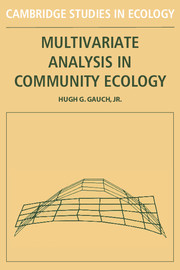Summary
A review of multivariate analysis in community ecology is timely for several reasons. This field has been extensively developed recently, with many preferred methods only a few years old. Also, multivariate analysis is receiving wider usage in applied ecology and allied fields. Finally, this topic is timely because of the urgency of making wise choices concerning ecological problems. In tackling these problems, multivariate analysis is a major research approach because many ecological problems involve numerous variables and numerous individuals or samples (and hence involve multivariate data), and many problems cannot be investigated experimentally because of practical restraints. Multivariate analysis of community data cannot replace experimental manipulation, for example, but neither can experimentation replace multivariate analysis. Each research methodology has unique advantages, and the strongest research strategy employs all methodologies.
Two decisions were fundamental to the planning of this book. First, this book is relatively brief and emphasizes the preferred techniques of multivariate analysis. Such a strategy is possible because comparative tests have demonstrated the superiority of relatively few of the many proposed techniques. Furthermore, the primary concerns of most readers are with ecological or related subject matter, not with methods. This book is complementary to longer and more technical treatments by Orlóci (1978a) and Whittaker (1978a,c). Direct gradient analysis, ordination, and classification are presented as a methodological triad, and an integrated approach is described for solving research problems. Second, this book stresses both principles and applications.
Information
- Type
- Chapter
- Information
- Multivariate Analysis in Community Ecology , pp. ix - xPublisher: Cambridge University PressPrint publication year: 1982
